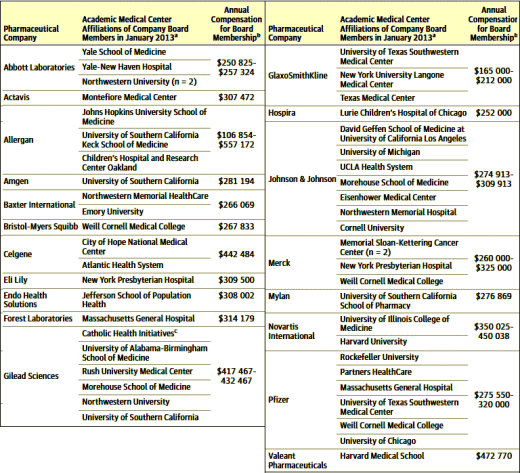Milwaukee Journal SentinelBy John FauberApril 1, 2014While university doctors who moonlight for drug companies have faced intense scrutiny in recent years, new research suggests much larger sums of money are being paid to their bosses — the leaders of medical schools and hospitals who serve on drug company boards. Looking at the world’s 50 largest drug companies, researchers found that 40% had at least one board member who held a leadership position at a U.S. academic medical center — including medical school deans, chief executive officers, department chairs and university presidents.
The average annual compensation from the drug companies was $313,000, according to the paper published today in the Journal of the American Medical Association. "These relationships present potentially far-reaching consequences beyond those created when individual physicians consult with industry or receive gifts," the researchers wrote.
Others who were not a part of the paper said such lucrative moonlighting for drug companies with vested interests simply should not be done by university leaders who oversee independent research and the instruction of medical practitioners…hat tip to Pharmagossip…

http://www.margaretsoltan.com/?p=43588
Steve Lucas
This is why we need government funded research by independent research groups.
The privatization of medicine is having horrific effects. Psychiatry is not alone in the development and over-prescribing of unnecessary drugs, nor the over emphasis on “preventive” medicine that is ‘supported’ by drug company experimercials and too little objective scientific exploration and feedback from the “consumer”. The fact that so many people believe that the double-blind study is the gold standard and most scientifically reliable form of research tells us everything we need to know about how much drug companies dominate medical thinking.
Oy, Steve— I’m been thinking of subscribing to the Boston Globe because it appears to have better reporting than most, but I’m not that interested in Boston. I’ve already filled my quota of free articles with the Globe, reading up on the Justin Pelletier case. Reuters has open access, but is sloppy and yellow. New York Times charges five dollars a week for unlimited digital access. Twenty dollars a month is substantial for me, but I’m thinking I’m just going to have to do it, because there are so few trustworthy blogs dealing with important issues without excessive opinion.
Poop. I’ll tell my 24/7 financial supervisor that I need it.
Please allow me to repeat yet again that conflict of interest in psychiatry academic leadership is not just bad form, it results in bad clinical care and PATIENT HARM when the cr*p that’s produced filters down to clinicians.